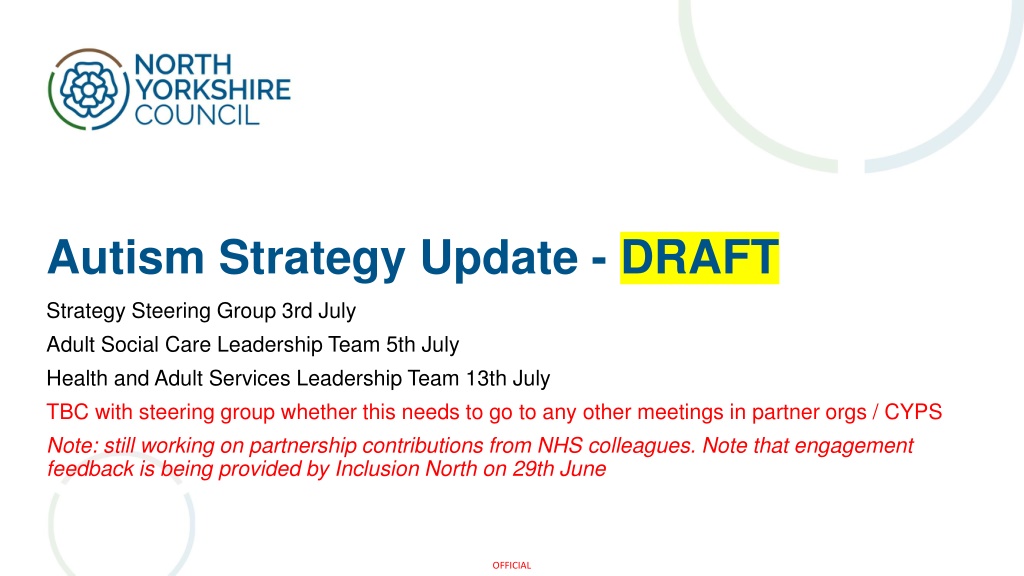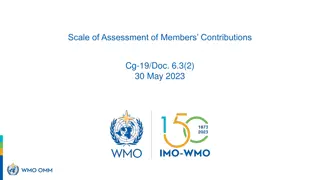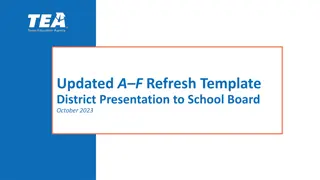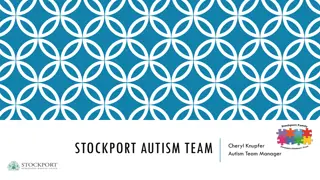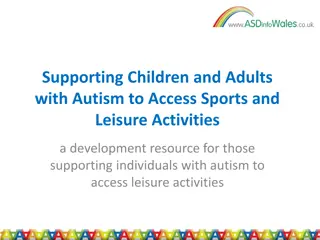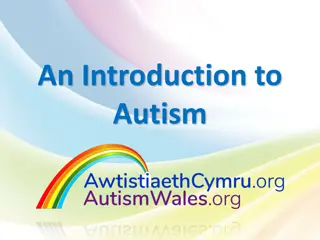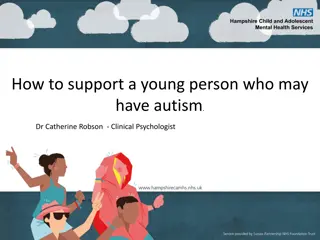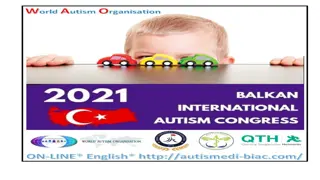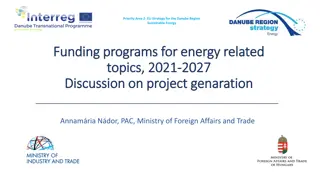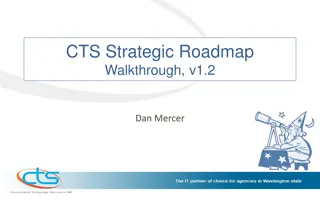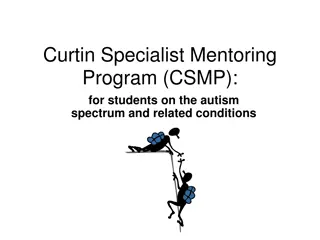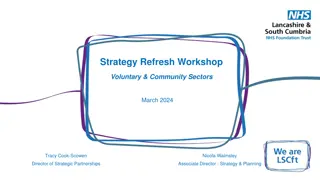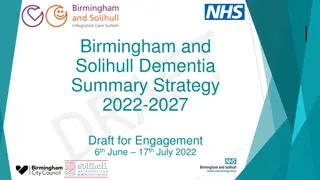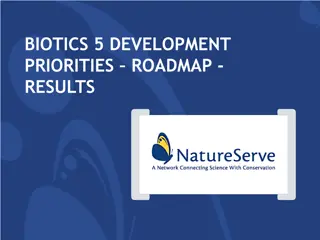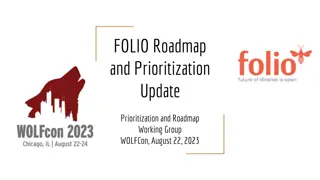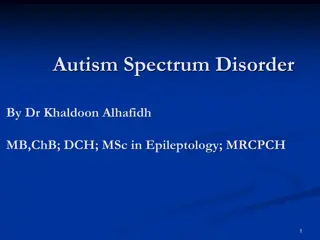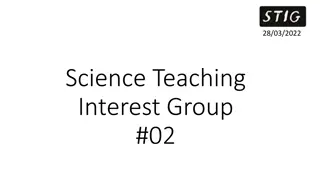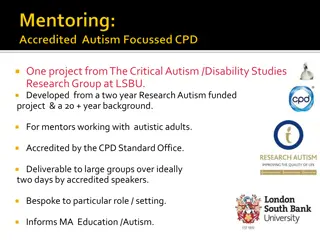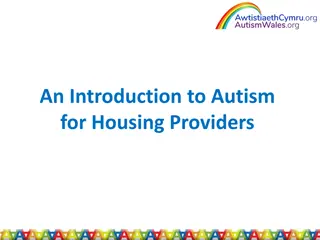Local Autism Strategy Refresh: 2021-2027 Roadmap
This draft strategy outlines the roadmap for refreshing the local Autism Strategy from 2021 to 2027. It includes mapping national priorities, celebrating achievements, gathering feedback, and planning for future developments. Engagement with autistic individuals, carers, and professionals is a key focus, with milestones set for consultation and action plan delivery aligned with new national priorities. The approach emphasizes partnership engagement and inclusive decision-making to address community needs effectively.
Download Presentation

Please find below an Image/Link to download the presentation.
The content on the website is provided AS IS for your information and personal use only. It may not be sold, licensed, or shared on other websites without obtaining consent from the author. Download presentation by click this link. If you encounter any issues during the download, it is possible that the publisher has removed the file from their server.
E N D
Presentation Transcript
Autism Strategy Update - DRAFT Strategy Steering Group 3rd July Adult Social Care Leadership Team 5th July Health and Adult Services Leadership Team 13th July TBC with steering group whether this needs to go to any other meetings in partner orgs / CYPS Note: still working on partnership contributions from NHS colleagues. Note that engagement feedback is being provided by Inclusion North on 29th June OFFICIAL
Purpose This presentation will: Map the 2021-2026 national strategy priorities against the previous local strategy themes to show areas of continuity and new areas of focus Celebrate key achievements from the last local strategy to date supported by stories and case studies Highlight feedback and emerging themes to date from the ongoing engagement to inform the refreshed local strategy Share, based on the above, the areas we already know we want to further develop in the refreshed local strategy, feedback and discussion (noting that some areas are more developed than others at this stage) Update on the current timeline, proposed plan and next steps for developing a refreshed local Autism Strategy aligned to the new national priorities to take us to 2027/28 OFFICIAL
Engagement Autistic People and Carers Events and survey undertaken in April/ May. Themes are being transcribed by Inclusion North by End of June. Analysis July and further focused sessions Wider engagement planning for 26 onwards Sept Consultation launch end November - end March build in 2 extra weeks for Christmas holiday period. Partnership Engagement There are 5 in person and 2 online engagement professional events booked from 10th 18thJuly Professional engagement session: NY Equality and Inclusion Partnership 12thJuly 2023 and Children and Young People Providers and Partners event 20thJuly 2023 OFFICIAL
Approach and key milestones Strategy refresh 2024-2027 Refresh of the strategy aligned to new national strategy priorities with 3 year action / delivery plan 2024-27 In tandem with this, begin working towards a new local strategy from 2027/28 onwards including continued comprehensive needs assessment, co-production and engagement Overseen by partnership steering group including a Carer, NYC Children and Young People Service (CYS) and Health and Adult Services (HAS), North Yorkshire Police, the Integrated Care Board (ICB), Healthwatch and Community First Yorkshire. Working to expand membership to include Youth Justice / Probation / Police. Proposed content Looking back on our work in the last strategy achievements, gap analysis and areas still to develop What do people tell us is important to them? - Autistic people, carers, professionals, partners What does the data tell us? Local delivery/action plan aligned to national priorities, and governance arrangements Plans for 2027/28 onwards OFFICIAL
Introduction Autism is a lifelong developmental disability that affects how people perceive, communicate and interact with others. NY Strategy (development) Autistic people see, hear and feel the world differently to other people. Autism varies widely and is often referred to as a spectrum condition, because of the range of ways it can impact on people and the different level of support they may need across their lives (national strategy 2021). National strategy for autistic children, young people and adults: 2021 to 2026 Think Autism 2014 Approximately 6,155 Autistic people live in North Yorkshire (based on applying approx. 1% to North Yorkshire pop estimate ONS 2021 census) Autism Act 2009 OFFICIAL
Priorities and themes Mapping the 2021-2026 national Autism Strategy priorities against the themes from the previous local strategy shows areas of continuity and new areas of focus for us: National Strategy for Autistic Children, Young People and Adults 2021 2026: Priorities The Changing Landscape of Autism in North Yorkshire 2015 2020: Themes Raising awareness and training Information and signposting Employment and education Supporting people with autism through key life changes Employment and education Improving understanding and acceptance of autism within society Improving autistic children and young people s access to education, and supporting positive transitions into adulthood Supporting more autistic people into employment Tackling health and care inequalities for autistic people Information and signposting Support for people with autism and their families Building the right support in the community and supporting people in inpatient care Support for people with autism and their families Assessment and diagnosis Information and signposting Working together Improving support within the criminal and youth justice systems [new area of focus] Carers (additional local area of focus for NY) Working together OFFICIAL
Improving understanding and acceptance of autism within society What does the national strategy say? Help people to understand how Autism can affect people differently, including the difference in how Autistic women and girls present. Help to change people s behaviour towards Autistic people and their families. Encourage more businesses, public sector services and different parts of the transport system to become more autism- inclusive, so that autistic people can access these spaces and services, just like everyone else. What have we achieved since 2015 which we can build on? Delivery of programmes of activity during national Autism Awareness Week including information stands and display boards, coffee and cake mornings and links with local employers to support Autistic people into employment Improved access to online information about support and activities for Autistic children, young people and adults through North Yorkshire Connect and the SEND Local Offer including local and regional groups specifically for Autistic people Making North Yorkshire libraries Autism Friendly and increasing access to autism resources (see case study). The Unlocking Autism Plus training programme for parents and professionals includes a specific session on girls and autism (see case study) OFFICIAL
What have people told us through engagement? What has worked well? Funding of local community groups (grassroots) by NHS and Early Help When it works well its due to the individual having experience (rather than training) of autism Mandatory training gives people an awareness but not necessarily an understanding Transport - airports. Some services are working well when they are aware of autism Social media has had a positive impact on the awareness and understanding of autism and creating positive support and information groups Examples of positive experiences, bus services have improved for disabled people, train services have more services for disabled people, SpecSaver s were understanding, very accommodating, GP surgery - quiet waiting area, very understanding Nursery teacher awareness/ parent awareness Nurseries are more aware and more flexible (this is critical) What has not worked well? Negative experiences with the mental health trust. Social workers not understanding. No induction/ no handbook. Length of diagnosis process took 10 years. Lots of organisations, not joined up. Visited by numerous people. No investment into supporting the infrastructure of Autism led groups. Stigma still exists. OFFICIAL
Improving understanding and acceptance of autism within society Draft Actions Measuring success Develop a comprehensive communication and engagement programme for awareness-raising events and access to information, promotion of services, activities and offer throughout the year. Increased opportunities to promote active co-production from Autistic children, young people and adults as well as the wider community. Increased awareness and improved access to local communities/ facilities eg libraries, swimming pools, shops etc. Co-produce an Autism Friendly social initiative/movement to make North Yorkshire communities, businesses and services Autism Friendly Increased emotional resilience and sense of belonging in Autistic People monitored through co-production opportunities. Build on opportunities to work more broadly across North Yorkshire Council services following local government re- organisation to raise awareness, training and improve support and access for Autistic people, linking into services including housing, leisure, tourism, businesses, town centres, transport, locality community partnerships. Increased number of people attend courses (monitored via the Autism Strategy Group) and increased confidence and skills of workforce across education, care, employers and parents/carers including in respect of autism in girls Continue to improve the delivery and reach of Autism Training programmes including Unlocking Autism Plus which has a focus on autism in girls (see case study) OFFICIAL
Improving autistic children and young peoples access to education, and supporting positive transitions into adulthood SEND system to support Autistic children and young people to access the right support within and outside school. Schools to provide better support to autistic people to reach their potential to prevent permanent exclusion or suspension from school. Improvements to the support for autistic people preparing for adulthood to prevent avoidable crisis / admission to inpatient mental health services. What does the national strategy say? Autism Education Trust transition guide sent to all schools/ education settings to support children transitioning from EYFS to reception, Year 6 to Year 7 and post 16 transitions. Established the Autism Education Trust Hub post 16 delivery. NYC has a preparing for adulthood pathway which has recently been reviewed. Social work staff from adult services will now support children s social workers working with young people in transition from as early as 14 (on a case-by- case basis) to ensure earlier consideration and joint development of education, employment, care and housing plans Peer Support for Autistic Children and Young People Talkabout, Lego and sibling groups and peer awareness sessions are a consistent offer through the SEND Intervention Pathway Hubs. There are also a range of activity-based groups for children with disabilities (including autistic children) Autism Champion roles across Children s and Adults Services, supported by expansion of training (see case studies) Training offer to parents continuation / expansion of Cygnet training throughout the life of the strategy. Face to face sessions suspended during Covid lockdowns however training was developed into virtual Unlocking Autism programme which can be accessed by parents irrespective of diagnosis alongside professionals (see case study) Conferences and webinars for parents and professionals including a conference hosted by NYPCT and NYC in 2018 and a programme of webinars since Covid lockdowns covering a range of topics which are currently reviewed with Parent Carer Voice groups to extend this offer and ensure accessible delivery. What have we achieved since 2015 which we can build on? OFFICIAL
What has worked well? Some main stream schools are aware and pro-active in seeking education healthcare plan There is not enough special school provision but they do work well when available Brooklands is good Montessori nursery (method of teaching) very autism friendly, practical support/ life skills. Private funding government, need to fund and advertise this Learning mentor listened to parent Wavell Community Infant and Junior School (positive experience) Every school has a SEND policy and a named SENCO What has not worked well? Lack of diagnosis within education Schools don t recognise masking SENCOs should not be viewed as someone who diagnoses, they should only be coordinating SEND provision Schools won t help /support if there is a problem seen at school Couldn t connect the dots, passed from school to school, no recognition of autism Duration to get diagnoses with no interim support Online assessments (during Covid this worked well) Lack of awareness of autistic traits Teachers cannot always spot it Main stream school child has to conform whereas in special school teaching is individualised No special schools to support high functioning girls in North Yorkshire Cost, lack of staffing Curriculum not flexible Environment not suitable/ adjustable CYP with low support needs are missed and those masking Reasonable adjustments not seen as appropriate or necessary and are disregarded Mainstream and SEN settings with no in-between. Enhanced mainstream does not have enough support/ understanding/ training to fill in the gap What have people told us through engageme nt? OFFICIAL
Improving autistic children and young peoples access to education, and supporting positive transitions into adulthood Draft Actions Measuring success Continue to work with Schools, families and children/ young people to make schools more accessible and Autism Friendly. Establish an education framework for Autistic children who are identified as unable to access education in a formal school/education setting. Work with SENCos to improve early identification of SEN support required to meet needs early and improve outcomes for children. Continued roll out of Unlocking Autism and Unlocking Autism Plus training for parents and professionals supporting Autistic people throughout childhood and preparing for adulthood (see case study) Implementation of changes to the governance and delivery of the NYC Preparing for Adulthood pathway for joint working and support planning for Autistic children aged 14+ where appropriate. All staff working directly with Autistic people across health and social care to have access to Autism training refreshed every 3 years. Improved access to local services and independent housing solutions for Autistic young people and adults. Continued work with Parent Carer Voice to extend and improve the webinars for parents and professionals. Continued engagement and coproduction with Autistic children, young people, adults, parents and carers to develop Autism support, pathway s and services Standardised preparing for adulthood curriculum agreed across education providers with a clear implementation plan. Improved opportunities for further education for Autistic young people and reduction in NEET (not in education, employment or training) amongst Autistic young people Improved relationships with Autistic people and their families and carers. Reduction in children not in school/education provision; reduced exclusions; improved attendance Reduction in out of county provision. Stronger education provision across mainstream, targeted and specialist offer for Autistic people, specifically high- achieving Autistic girls. Improved outcomes for children & young people to independently access their community resulting in increased emotional resilience and belonging. Increased number of Children and young people whose needs are met with SEN support. OFFICIAL
Improving autistic children and young peoples access to education, and supporting positive transitions into adulthood Case Study: Unlocking Autism (Plus) Training Programme (slide 1 of 2) Unlocking Autism Unlocking Autism - - Content Content All share the same message, same strategies to support Autistic Person. Unlocking Unlocking Autism Autism 2 day training programme for parents, education professionals and social care colleagues Unlocking Unlocking Autism Plus Autism Plus Builds on Unlocking Autism for parents/ professionals on specific areas of communication and interaction Autism strengths, differences and how to support Communication expressing, understanding and interacting Sensory preferences and impact and how to get ready to learn Resilience self-reflection and responding to difficult situations Open Access no diagnosis required Behaviour understanding the purpose of behaviour and knowing how and when to respond Unlocking Autism Plus Unlocking Autism Plus Content 4 optional standalone sessions; or 1 full 4 optional standalone sessions; or 1 full- -day course Content day course Girls and Autism Identity Practical Support not just theory! PDA Selective Mutism OFFICIAL
Improving autistic children and young peoples access to education, and supporting positive transitions into adulthood Case Study: Unlocking Autism (Plus) Training Programme (slide 2 of 2) By Autumn 2023 By Autumn 2023 Review current course content to ensure in line with current thinking and is positive and neuro-affirmative in nature (underway) Record content of Unlocking Autism and Unlocking Autism Plus to provide on-demand courses to help reach a wider audience and allow for refresher training Continue to provide 1 live training course per year for parents who prefer live delivery to self-study Next steps By Summer 2024 By Summer 2024 Develop Unlocking Autism Teens specifically looking at issues affecting autistic young people eg puberty, sexuality, risk-taking behaviour, emotional wellbeing. This will be bite-size on-demand sessions for the same audience as UA and UA+. OFFICIAL
Building the right support for Autistic People Actions Measuring success Support WLi for CYP ASD across NYY ICB to explore a service model that will offer a person-centred and age-appropriate care that is tailored to individual mental and physical health needs rather than age alone. Explore an ASD coordinator role that could support Wl and those going through the process Commission a housing needs assessment which will help us develop our housing market and support discharges from hospital. In addition to providing policy and strategic context for the programme, it will include demand and population growth forecasts We will explore across the ICB the possibility of having an ICB Accommodation Plan and help partners to understand demand and gaps at a place-based level. We will work with local partners to find housing solutions for autistic people Working together with housing providers to ensure future housing developments can support autistic people OFFICIAL
Improving support within the criminal and youth justice systems Build a clearer understanding of how autistic people come into contact with the criminal and youth justice systems, and the type of support they may need across court, prison and under probation supervision. Improve the police and wider criminal and youth justice system staff s understanding of autism so that autistic people are more able to receive the right support, adjusted to their needs, as well as ensuring that different parts of the justice system from prisons to courts become more autism-inclusive. What does the national strategy say? This priority is a new priority as part of the 2021 National Autism Strategy and at the time of writing, The changing landscape of Autism in North Yorkshire didn t have a direct priority around criminal and youth justice systems. What have we achieved since 2015 which we can build on? However, social care teams do support individuals who may be supported by Police/criminal justice system and the relevant representatives are invited to Multi-Disciplinary Team meetings on an individual basis. Police representatives also previously attended the Autism Steering Group during the implementation of the strategy and are valued partners in supporting Autistic People. NYC are in the process of updating membership of the current Autism Steering Group to ensure membership includes representatives from the Police and criminal justice system. OFFICIAL
What has worked well? What has not worker well? No information about what is available- individual rights (Inc. Human Rights) People are misunderstood, especially if non verbal/ meltdown then arrested Officers are not autism aware/ trained Probation services are not there Meltdowns need dealing with appropriately and not to be criminalised Nobody informs you of the appropriate adult Sick of saying you do not realise he is autistic Melt downs when handcuffed Police have little experience of autism Humiliated by CJS Restraint issues ie. touch Environment may be causing sensory overload Recognising distress behaviours as opposed to violence No direct experience but others experiences is a lot of undiagnosed neurodiversity Young people failed by education systems, vulnerable to extreme groups online and social care Desire to fit in and have friends can blinker them to inappropriate relationships Rigid thinking and theory of mind can make grey areas difficult to understand and navigate Police seem to be used to mopping up social cares mistakes and provide unsupported care during the hours that social care responsibility does not apply What have people told us through engagement? No feedback OFFICIAL
Improving support within the criminal and youth justice systems Actions Work with police, criminal justice, youth justice and probation professionals to improve Autism awareness, and provide support as required. Unlocking Autism training offer for police, criminal and youth justice service. Gather data associated with autistic children, young people and adults involved with criminal and youth justice system. Continued engagement and coproduction with Autistic children, young people, adults, parents and carers to develop Autism support, pathway s and services Ensure membership on the Autism Steering Group has full representation from Police and Criminal Justice System. Measuring success Reduced number of children and young people referred to youth justice system. Reduction in Autistic Adults with forensic background staying in hospital longer than required. OFFICIAL
Carers NYC additional priority theme There is no specific priority relating to carers of autistic people in the national strategy, however in North Yorkshire we want to make this area an additional local priority in recognition of the importance of supporting carers in their roles What does the national strat egy say? Introduction of Cygnet training for parents and carers to support Autistic children and young people post diagnosis. During Covid, this training was reviewed and redesigned to enable an online offer to be available to parents/ carers as required. Unlocking Autism was launched to support people/families per and post diagnosis and no longer requires the individual to have a diagnosis to access it (see case study) The Unlocking Autism training has evolved again and now entails a second part, Unlocking Autism Plus to provide specialised information on particular areas such as women and girls (see case study) Carers have been involved in engagement opportunities including on the development of the TEWS Autism Framework and we are working on an engagement plan to support and develop more opportunities for Autistic people and their carers to be involved in Co-production. NYC has worked closely with North Yorkshire Parents and Cares Together (NYPACT) forum throughout the life of the strategy and will continue to work together with Parent Carer Voice groups. Development of a Parent Carer Group in Craven with support from Carers Resource. What have we achieved since 2015 which we can build on? OFFICIAL
What has worked well? Carers Plus Yorkshire offers carers assessments, they work with adult, child, parent carers Can self refer to NYCC Carers Resource is helpful and try to put parents/ carers on right path, help with info if needed a form filling What has not worked well? Carers not aware they can have a young carers assessment and signposted People aware that social workers are very stretched Carer services are not crisis services Carers are very lost and alone Didn t know why assessment held any purpose Feel like a leaf blowing in the wind NYCC miss the voices of low support carers Carers assessments not offered information or information provided not easily accessible No signposting to support available Limited support in more remote areas Services that are available are overstretched and you get put on a waiting list to access help No criteria for parents/ carers assessments Being arrested sister responsible adult person to contact Awareness undiagnosed What have people told us through engage ment? OFFICIAL
Carers NYC additional priority theme Actions Measuring success Using learning from previous engagement and the Co-production and engagement group, further development of co-production opportunities for parents and carers through a comprehensive engagement plan. Increased Parent/ Carer voice. Improve relationships with Parents and Carers. Continuation of work with Parent Care Voice Groups and adult self advocate groups. Link to new Carers Strategy for North Yorkshire OFFICIAL
Next steps + engagement schedule Timescale Action July/ Aug Continue to collate achievements for look back report Data and research analysis Continue engagement with autistic people (detail to be included following engagement subgroup 28.06.23 and themes from Inclusion North 30/6/23) Host professional engagement events w/c 10thand 17thJuly July October Further drafting of strategy content and 3 year action plan based on the above, and endorsement through governance boards November Approval to consult OFFICIAL
Professional Engagement Plan 10th 20th July Name of events Date Time Venue Locality Lead / Facilitation Equipment Notes 10th July Autism Engagement Event 10:00 12:00 Project Room SB202, South Block, County Hall, Northallerton Northallerton Charlotte Rudd Stacey Annandale Tablecloths, Pens, Posits, flip charts, Laptop and connector, screen, extension cable, tea, coffee, water, cups, milk, sugar, spoons 2 hour sessions Offer from Health Watch of volunteers to support with facilitation buddy up arrangement 11th July Autism Engagement Event 10:00 12:00 Seaview Conference Room, SBC, Scarborough Scarborough Stacey Annandale 11th July Autism Engagement Event 14:00 16:00 Online Stacey Annandale Tilly Skeels? 14th July Autism Engagement Event 10:00 12:00 TBC Selby Jacob Tilly Skeel Stacey Annandale 17th July Autism Engagement Event 14:00 16:00 Large Meeting Space Jesmond House Harrogate Michelle Miles 18th July Autism Engagement Event 10:00 12:00 Online X county Stacey/ Liz Golding/ Steven Crutchley 12th July NY Equality and Inclusion Partnership 14:00 16:00 Online X county Stacey Community First Yorkshire 20th July Children and Young People's Providers and Partners - Autism Engagement 14:00 16:00 Online X county Stacey Community First Yorkshire Request for ASCLT and HASLT to support the promotion of the professional engagement OFFICIAL
